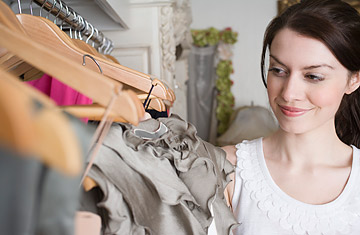
Lee Eisenberg knows how to shop. He can see through marketing campaigns, advertisements, and all the subtle nuances behind a store's attempt to make you spend your money. In his new book, Shoptimism the former executive vice president of clothing retailer Lands' End (and former editor-in-chief of Esquire) examines why we shop, how we buy, and what sort of tricks the advertising industry tries to play on us.
Why do we buy things?
There are two basic kinds of buyer. The classic buyer who tries to buy only things that he or she needs, who thinks about it rationally, who compares prices. The romantic buyer shops with his or her heart. The romantic may buy something because it is trendy or it has a really cool design or because he or she is feeling blue and needs a pick-me-up. It is someone who cares less about durability and more about emotional satisfaction and appeal.
You started Shoptimism before the recession. How did the economic crash change the book?
A lot of people who might have been romantic buyers in 2007 steadily became more and more classic. They had to be much more mindful about how to spend their money. Suddenly cool didn't mean trendy, it meant something that would last or was a really great bargain.
In the book, you talked a lot about anti-consumerists, calling them them 'buy scolds' and 'ad bashers'. Do you agree? Do you think advertising agents are as nefarious as some people make them out to be?
Anti-consumer groups do have a point, but they assume that we are defenseless as consumers, and that we don't see through advertising as well as we do. I think most people do see through it, if only because advertising is just so ubiquitous. If nothing else, I think that the advertising community has hurt itself by putting out so many ads. It's this constant static in our lives and as a result I think a lot of it is cancelling itself out.
So what do we pay attention to?
People we know. Other customers. Most companies that have put uncensored and unfiltered user reviews on their websites have found that it doesn't hurt business at all. I think a lot of companies are finding that they are far better off by letting people talk openly. That becomes much more of a deciding factor in a consumer's decision to buy than a commercial.
In Shoptimism you examine the idea of need versus want. Obviously we need food and shelter, but we classify other items as "needs" as well.
What is a need, really? We have physical and emotional needs. There is a relationship between material stuff and emotional sense of satisfaction. A material thing could have (and often does have) a profound influence on our daily lives, and can be defined as a need.
What is something that serves as an emotional need?
It depends on the person. For example, expensive athletic shoes like Nikes — the right style or model — are totally superfluous and over-priced, but kids who don't have the right kind of shoe face potential ostracism from their peers. I'm not arguing that everyone should go out and buy their kids $120 Nikes, I'm just saying that there is a social pressure — a sense of need. A kid who has those shoes may feel better about himself than if he didn't have them.
You worked at Target for a while. What things were you surprised to learn about big box retail?
What I found most useful was the [employee] orientation. I was very impressed with the degree of ethical training: sexual harassment, how to approach and communicate with disabled customers, what to do in a sticky situation, how to act during a robbery. But you don't get trained in product details. So, if someone comes in and wants to know why one product is better than another, you're really not trained in that.
Have you changed your shopping habits since writing this book?
Not dramatically. What is different is what I notice when I walk into a store. I walked into a Gap recently and I immediately saw that there was no clear pattern to how old the customers were. There were some people in their late 30s, some people in their early 20s. The music that was playing was a kind of soft rock, pop, instrumental music. Their campaign was about legacy, "We've been selling great-fitting jeans for 40 years." Then I walked into an Express store. The music was up-tempo and hipper. It wasn't edgy, but there was a lot more bass. Instead of legacy sales, it all had to do with trend. The layered look is very in right now; by selling things that go together there is a much greater chance that a store is going to sell you more than one item.
How will shoppers act this holiday season?
Last year was a complete and utter disaster for retailers. They had too much inventory and it became common to see large discounts really early in the season. A lot of people have asked me this year if they should buy early or wait for the huge sales, and it's really kind of hard to tell. I'm pretty certain that you aren't going to see those incredibly deep discounts because the inventories are much leaner than they were a year ago. Companies have gotten very smart about not ordering too much.
Do you think we'll ever go back to previous overwrought spending?
Not for a while. I think things are going to get better, but I think there has been a fundamental change in people's heads. We are not going to stop buying, but we may not shop to the degree we did in the past. I really think we are going to be more measured for the foreseeable future.
